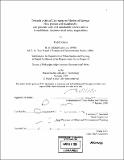Towards a global consensus on matters of science : how process and membership can generate valid and sustainable science advice in multilateral environmental treaty negotiations
Author(s)
Kohler, Pia M. (Pia Marili)
DownloadFull printable version (11.06Mb)
Other Contributors
Massachusetts Institute of Technology. Dept. of Urban Studies and Planning.
Advisor
Lawrence E. Susskind.
Terms of use
Metadata
Show full item recordAbstract
In most multilateral environmental agreements (MEAs), science advisory bodies (SABs) are tasked with producing guidance on scientific aspects of the problem. SABs are a necessary infrastructure of global environmental management because they provide a forum where experts come together to negotiate a consensus on matters of science relevant to a given MEA. This consensus, much more than merely an assessment of available information, creates new knowledge that feeds into decision-making. I propose, that to contribute effectively to implementation, this consensus must be both valid (scientifically accurate) and sustainable (acceptable to stakeholders and not requiring frequent renegotiation). This thesis identifies two institutional design features of an SAB that are crucial for obtaining a valid and sustainable outcome: representative membership, and a transparent and flexible organization of work. A three-tier SAB design is recommended based on these findings, and its theoretical application to the provision of science in the Biodiversity regime is explored. Representative membership describes the individual experts chosen to contribute to an SAB's work. To maximize validity and sustainability, I identify several kinds of diversity which can enhance the validity and sustainability of the SAB outcome, namely national. economic. institutional, disciplinary, regional and personal diversity. A process which is both transparent and flexible are also classified into several types of transparency and flexibility. including: access to meetings; document release; and the establishment of norms and procedures. This thesis concludes that while all these types of diversity, flexibility and transparency have the potential of improving the SAB consensus' validity and sustainability, the relative importance assigned to each of these should be tailored to the MEAs needs to produce the best consensus. The thesis is based on the in-depth study of six MEAs: the UN Framework Convention on Climate Change and the Intergovernmental Panel on Climate Change, the Ramsar Convention on Wetlands, the Convention on Biological Diversity and its Biosafety Protocol, the Vienna Convention and Montreal Protocol on the ozone layer, the Stockholm Convention on Persistent Organic Pollutants, and the Rotterdam Convention on a Prior Informed Consent Procedure for the transport of hazardous chemicals.
Description
Thesis (Ph. D.)--Massachusetts Institute of Technology, Dept. of Urban Studies and Planning, 2006. "February 2006." Includes bibliographical references (p. 167-174).
Date issued
2006Department
Massachusetts Institute of Technology. Department of Urban Studies and PlanningPublisher
Massachusetts Institute of Technology
Keywords
Urban Studies and Planning.